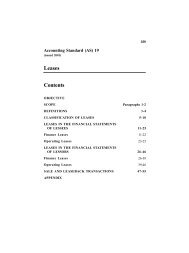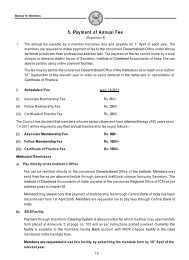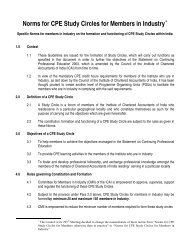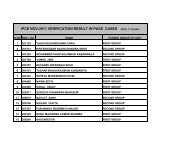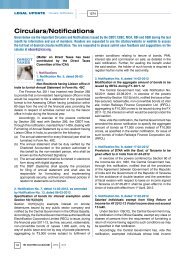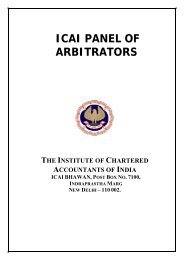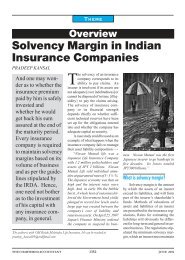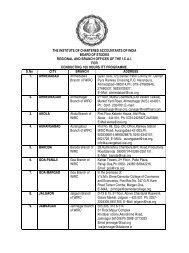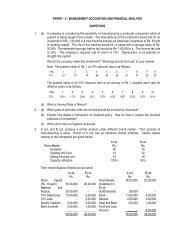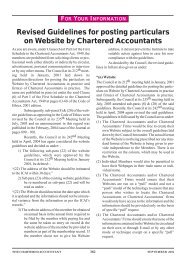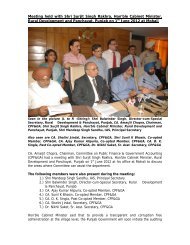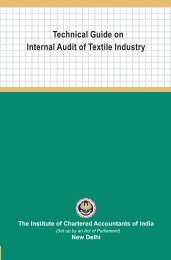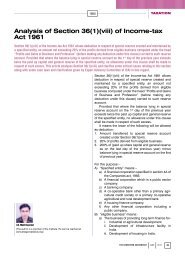The Chartered Accountant
The Chartered Accountant
The Chartered Accountant
Create successful ePaper yourself
Turn your PDF publications into a flip-book with our unique Google optimized e-Paper software.
own legal counsel as to whether a<br />
contravention of a law or regulation<br />
is involved, the possible legal consequences,<br />
including the possibility of<br />
fraud, and what further action, if any,<br />
the auditor would take.<br />
Evaluating the Implications of<br />
Non-Compliance (Ref: Para. 21)<br />
A17. As required by paragraph 21, the<br />
auditor evaluates the implications of<br />
non-compliance in relation to other<br />
aspects of the audit, including the<br />
auditor’s risk assessment and the reliability<br />
of written representations. <strong>The</strong><br />
implications of particular instances of<br />
non-compliance identified by the auditor<br />
will depend on the relationship of<br />
the perpetration and concealment, if<br />
any, of the act to specific control activities<br />
and the level of management or<br />
employees involved, especially implications<br />
arising from the involvement of<br />
the highest authority within the entity.<br />
A18. In exceptional cases, the auditor<br />
may consider whether, unless prohibited<br />
by law or regulation, withdrawal from<br />
the engagement is necessary when management<br />
or those charged with governance<br />
do not take the remedial action<br />
that the auditor considers appropriate in<br />
the circumstances, even when the noncompliance<br />
is not material to the financial<br />
statements. When deciding whether<br />
withdrawal from the engagement is necessary,<br />
the auditor may consider seeking<br />
legal advice. If withdrawal from the<br />
engagement is prohibited, the auditor<br />
may consider alternative actions, including<br />
describing the non-compliance in an<br />
Other Matter(s) paragraph in the auditor’s<br />
report. 12<br />
Reporting of Identified or Suspected<br />
Non-Compliance<br />
Reporting Non-Compliance to<br />
Regulatory and Enforcement Authorities<br />
(Ref: Para. 28)<br />
A19. <strong>The</strong> auditor’s professional duty to<br />
maintain the confidentiality of client information<br />
may preclude reporting identified<br />
or suspected non-compliance with<br />
laws and regulations to a party outside<br />
the entity. However, the auditor’s legal<br />
responsibilities vary under different<br />
laws and regulations and, in certain circumstances,<br />
the duty of confidentiality<br />
may be overridden by statute, the law or<br />
DECEMBER 2008 1090 THE CHARTERED ACCOUNTANT<br />
STANDARDS<br />
courts of law. Under the present legal<br />
and regulatory framework for financial<br />
institutions in India, their auditor has a<br />
statutory duty to report the occurrence,<br />
or suspected occurrence, of non-compliance<br />
with laws and regulations to supervisory<br />
authorities. For example, the<br />
auditor is required to report certain matters<br />
of non-compliance to the Reserve<br />
Bank of India as per the requirements<br />
of Non Banking Financial Companies<br />
Auditor’s Report (Reserve Bank) Directions,<br />
1988, issued by the Reserve Bank<br />
of India. Also, some laws or regulations<br />
require the auditor to report misstatements<br />
to authorities in those cases<br />
where management and, where applicable,<br />
those charged with governance fail<br />
to take corrective action. <strong>The</strong> auditor<br />
may consider it appropriate to obtain legal<br />
advice to determine the appropriate<br />
course of action.<br />
A20. In case of certain entities, such<br />
as national governments, regional (for<br />
example, state, provincial, territorial)<br />
governments, local (for example, city,<br />
town) governments and related governmental<br />
entities (for example, agencies,<br />
boards, commissions and enterprises),<br />
the auditor may be obliged<br />
to report on instances of non-compliance<br />
to governing authorities or to<br />
report them in the auditor’s report.<br />
Documentation (Ref: Para. 29)<br />
A21. <strong>The</strong> auditor’s documentation of<br />
findings regarding identified or suspected<br />
non-compliance with laws and<br />
regulations may include, for example:<br />
l Copies of records or documents.<br />
l Minutes of discussions held<br />
with management, those<br />
charged with governance or<br />
parties outside the entity.<br />
Material Modifications to<br />
ISA 250, “Consideration of<br />
Laws and Regulations in<br />
an Audit of Financial Statements”<br />
Deletions<br />
1. Paragraph A6 of the Application<br />
Section of ISA 250 deals with the application<br />
of the requirements of ISA<br />
250 to the audits of public sector en-<br />
tities regarding the additional audit<br />
responsibilities with respect to the<br />
consideration of laws and regulations.<br />
Since as mentioned in the “Preface<br />
to the Standards on Quality Control,<br />
Auditing, Review, Other Assurance<br />
and Related Services”, the Standards<br />
issued by the Auditing and Assurance<br />
Standards Board, apply equally to all<br />
entities, irrespective of their form, nature<br />
and size, a specific reference to<br />
applicability of the Standard to public<br />
sector entities has been deleted.<br />
Further, it is also possible that even<br />
in case of non public sector entities,<br />
there may be additional audit responsibilities<br />
with respect to the consideration<br />
of laws and regulations which<br />
may relate to the audit of financial<br />
statements or may extend to other<br />
aspects of the entity’s operations. Accordingly,<br />
the spirit of erstwhile A6,<br />
highlighting the fact that in case of<br />
certain entities, there may be additional<br />
audit responsibilities with respect to<br />
the consideration of laws and regulations,<br />
has been retained.<br />
2. Paragraph A20 of the Application<br />
Section of ISA 250 deals with the<br />
application of the requirements of<br />
ISA 250 to the audits of public sector<br />
entities regarding the obligation to report<br />
on instances of non-compliance<br />
to governing authorities or to report<br />
them in the auditor’s report. Since<br />
as mentioned in the “Preface to the<br />
Standards on Quality Control, Auditing,<br />
Review, Other Assurance and<br />
Related Services”, the Standards issued<br />
by the Auditing and Assurance<br />
Standards Board, apply equally to all<br />
entities, irrespective of their form, nature<br />
and size, a specific reference to<br />
applicability of the Standard to public<br />
sector entities has been deleted.<br />
Further, it is also possible that even in<br />
case of non public sector entities, the<br />
auditor may be obliged to report on<br />
instances of non-compliance to governing<br />
authorities or to report them in<br />
the auditor’s report. Accordingly, the<br />
spirit of erstwhile A20, highlighting<br />
the fact that in case of certain entities,<br />
there may be instances of reporting<br />
non-compliance to governing authorities<br />
or to report them in the auditor’s<br />
report, has been retained.q<br />
12Proposed SA 706, “Emphasis of Matter Paragraphs and Other Matter Paragraphs in the Independent Auditor’s Report”. <strong>The</strong> Standard is being formulated in the light of<br />
the corresponding International Standard.



